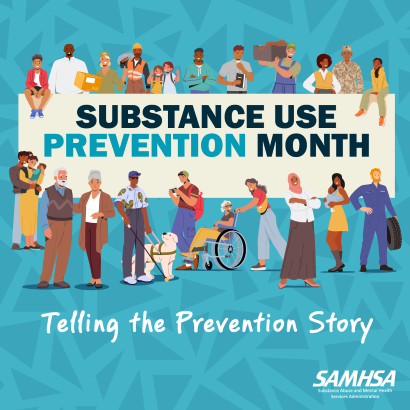
The month of October is designated as National Substance Use Prevention Month, a time for neighbors to recognize their collective power of prevention. Substance use disorder impacts both individual and community health — and as our youngest community members work to navigate their places in society, substance use/misuse is beginning at an earlier age, increasing their likelihood of developing substance use disorder.
Did you know that in 2022 our nation lost nearly 111,000 Americans to fatal overdoses and 1,000 of those were youth under the age of 18? We owe it to our rising generations to encourage, guide and support their decisions, and inform them about consequences, results and lasting impacts around those decisions.
Asheville, North Carolina, was chosen as one of just 20 communities across the country to receive $70,000 in funding over two and a half years to integrate more intentional one-on-one and group mentoring activities into existing afterschool, sports, environmental and outdoor education, and arts and culture programs through NRPA’s Mentoring for Youth Impacted by Substance Misuse grant. This grant is funded by the Office of Juvenile Justice and Delinquency Prevention in the U.S. Department of Justice and administered by NRPA, the national not-for-profit organization dedicated to building strong, vibrant and resilient communities through the power of parks and recreation.
I previously worked with Asheville City Schools in a variety of roles, with the last being the mental health student support specialist at Asheville Middle School. When I left the district to work for Asheville Parks & Recreation (APR), I promised some co-workers and my dear friend Principal Johnston that I would figure out a way to continue supporting the wonderful work of staff, as well as ways to support the blossoming of students!
APR received a grant to construct a program for our community utilizing NRPA's Youth Mentoring Framework. The resulting program uses mentorship targeted to specific students including those struggling with substance use disorder.
Called Go! Guiding Others!, Asheville Middle School (AMS) selects students they believe could benefit from a mentoring program. This specific program runs for 16 weeks, meeting weekly on Tuesday mornings in the students’ schools. In the mentoring framework, the topic of substance use/misuse only presents itself in week 14.
Since AMS targets students struggling with substance use disorder, I collaborate with RHA Health Services to run a combined program. They currently utilize Project ALERT, a resistance self-efficacy course for middle school students that aims to guide youth in making positive decisions and coping skills without drugs and alcohol.
ALERT stands for Adolescent Learning Experiences in Resistance Training. The 11-session curriculum covers mental health, school, peer pressure, substance misuse, personal goals, and ways to resist negative behaviors that can affect their paths toward adulthood. This course encourages teamwork between teachers and students, so that youth get to play an important part in their own learning. Students are able to have open and candid conversations about challenges with adults, play games, collaborate, and learn something new with each session.
The skills gained in Project ALERT will be great tools for youth to use as they leave middle school, go through high school, and on through their adult lives.
When sessions started, the referred students would not admit to me why they were referred. They wanted to keep the vaping incidents secretive. By running a combined program, building a relationship with a mentor, and providing education around substance use/misuse, students went from hiding their struggles to opening up about triggers and working on goals to refrain while in school. They also learned how to communicate positively with adults, why serving the community is important, and the qualities of a positive role model.
Hands-on activities encouraged excited participation. During the week that focused on responsibility, the students were given a child doll. They had to complete a daily journal with tasks that included taking pictures after completion. At first, the teachers were worried about how the students would mishandle the dolls. Much to their surprise the students took to becoming single parents as real as possible. The way they held their babies and were particular about ‘babysitters’ showed the serious side of the students. We discussed needs as well as budgeting. In these discussions, we also spoke about vaping in front of the child, and deciding on purchasing vapes or necessities.
One student who was referred to the program as an alternative to suspension after being caught using a vape in the restroom was allowed to do community service at the Stephens-Lee Community Center, where I am the facility supervisor. His duties that day were to help set up and serve our holiday meal to the students and parents in our afterschool program. He also assisted with cleaning up. On the ride home he asked how he could be a part of our afterschool program. He is still enrolled and comes to programming on the days he does not have sports.
Remaining flexible has been the key to our program’s success. Our youth have experienced life trials unlike any previous generation and the best ways to serve them may need to evolve as well. What works well one day or in one area may not work the same everywhere. As long as the belief and understanding is to provide a safe space for our most vulnerable population, we will continue to guide, support and mentor!
Angel Redmond is the Facility Supervisor at the Stephens-Lee Community Center and Go! Guiding Others Mentoring Program Coordinator for City of Asheville Parks & Recreation.
This project is supported by Grant # 15PJDP-22-GG-03735-MENT awarded by the Office of Juvenile Justice and Delinquency Prevention (OJJDP), Office of Justice Programs, U.S. Department of Justice. The opinions, findings, and conclusions or recommendations expressed in this publication are those of the author(s) and do not necessarily reflect those of the Department of Justice.


